#theater of marcellus
Text
Not Romeo, Not Juliet
Chapter 2: Great Stage of Fools
Fandom: Red Hood
Pairing: Jason Todd x f!reader
Warnings: bullying
Summary: Jason goes to auditions and at Dick's urging, tries to make friends, it doesn't turn out well
When we are born we cry that we are come / To this great stage of fools
— KING LEAR, ACT 4 SCENE 6
Jason had hoped to just coast through this theater class. He would get some side part like Fortinbras or Marcellus, in fact he was auditioning for those parts, not working super hard on getting anything right, just knowing he would be in the show and have a group of people who, so far, weren’t that bad. The other seniors, two guys and a girl, were alright and made him feel welcome as soon as he joined their row in the auditorium prior to auditions.
“You don’t look the theater type,” one of the guys, Jackson, said. Jason glanced over at him and shrugged as the other guy, Matt, muttered something about Luke Evans. “Ya, but Luke Evans is British, that’s why does theater.”
“My guardian signed me up, thought it would help me mellow out,” Jason said, trying to make conversation. This whole situation sucked but he might as well make the best of it, that’s what his therapist was always telling him anyway. He was reading over the few lines he was doing for Marcellus, ignoring the eyes of the girl, Chelsea, on him.
“What is with the white hair?” she asked finally. The guys stared at her. “Do you die it like that?”
“No, was in an accident over the summer, turned some hair white,” he said, very practiced in that response after the first couple days of school. He was getting a little tired of it honestly and couldn’t wait until everyone just forgot about him being new. She nodded and turned back to her book, throwing looks at him as she tried to read her lines.
“Jason Todd, Matt Peters,” called the theater director. Jason and Matt stood, going to the stage. “Ready for Marcellus and Horatio, Act 1, Scene 1, lines 70-90.” Jason brought the script up, checked where that was and put it down. He already knew the lines, had read Hamlet quite a few times, and didn’t want to bother holding the book. Matt started to look nervous, still holding up the script to read. As the scene started Jason felt himself slipping away. He was someone else, he didn’t have to be weird, zombie, ex-vigilante Jason keeping a lid on his emotions and his anger. He could be this guard, seeing ghosts and just trying to get by without losing him mind. Ya, he could do that.
“Good now, sit down, and tell, he that knows, Why this same strict and most observant watch…” he started. The words flowed out of him, and he found himself really getting into it. When the scene was stopped, he stood quietly, watching Matt eye him curiously.
“Where did you come from?” he whispered to him as they walked off the stage. Jason shrugged.
“Homeschool,” he answered. He sat back in his chair, pulling out Frankenstein, and starting to read that. He could hear the others discussing him but tried to ignore it. Then he heard them mention someone named YN and he stilled, thinking back to the alley and her bandaging his hand. Not the same person probably, but the name just sprung her face into his mind, and he had to shake himself to get back to the present. Weird.
“Hey Jason,” Chelsea called. He looked over and saw them all facing him. Great, ganging up on him, lovely. “So this show is going to be in the citywide high school Shakespeare competition in December, and we were thinking of going to check out the competition, Gotham Academy is having an open mic night fundraiser for their theater program on Friday night, how about you come with us?” Jason was about to say that sounds terrible when he thought about Dick that morning.
“You should make some friends, it wouldn’t be so bad to have to hang out here if you invited people over,” he had said over breakfast. “Plus, you’ve never really been allowed to have friends since you were like 10, why not make some now?” Jason had to admit he was right, once you became Robin it was hard to be friends with anyone, you just worried about them finding out, or them getting hurt. He wasn’t Robin anymore, he was just Jason, and that thought, being just Jason with no friends, did kind of suck. So fine, why not?
“Sure, what time and where we meeting?” he asked. Matt handed him a crumbled flyer that read Gotham Academy café, Friday night, 8PM. “Just meet you guys there?”
“Yes, it’ll be very fun,” Chelsea said. They were dismissed, the roles would be posted on Monday. The other seniors walked him out where he saw Dick waiting for him at the car. “Is that your dad?”
“No, that’s my older brother,” he said, heading over to meet him. Dick let him in the car and then joined him to drive. “Keeping tabs on me, mom?”
“Yes, I am,” Dick said honestly. “How did auditions go?”
“Fine, met a couple people, we’re going to some open mic night at Gotham Academy. Something about a Shakespeare competition?” Jason said, leaning his head back to the chair.
“Good, friends, friends will keep you out of fights clubs,” Dick mumbled.
“Not likely.”
Friday rolled around and Jason was heading out when Dick handed him a tracking device. He glared and snapped it to his leather jacket. If he didn’t Dick would just have one implanted anyway.
“You know that’s fucked up right? I’m not a puppy,” Jason said, grabbing his book and wallet.
“I know, but you’re also prone to not being where you say you’ll be,” he said. Jason grunted. One time he sneaks out and suddenly he’s never going to be trustworthy again.
“You know, sometimes I wonder if Bruce wouldn’t be better at this,” Jason snapped. Dick sighed, not saying anything. Jason knew he should take it back, but he was annoyed now so he just left instead, taking the bike from the other night and heading over to Gotham Academy. It was still warm in the late August evening and Jason didn’t really want to be inside at some café, so he was pleasantly surprised when he parked and saw chairs set up on a grassy lawn next to the school. There was a staging area on raised pallets and several people were already seated with coolers and bags of food from local restaurants. He felt more relaxed knowing that he wasn’t going to be confined to a closed in area with people he didn’t know and probably wouldn’t like.
He paid for a ticket and moved among the folding chairs, finding the others from school. They had two coolers and pulled a water bottle for him from one. He sat down, not sure what he actually expected. Seeing YN walk on stage at the beginning of the show wasn’t it though.
“Hello everyone, and thank you for coming to our open mic night fundraiser to help fund this year’s Shakespeare competition show ‘MacBeth’,” she said and a round of applause sounded. He looked around, seeing a decent size crowd there, more than he thought would show up for a theater program. He clapped at first, then noticed the others weren’t. He frowned as they shook their heads at him.
“What?” he asked as the first act started. They leaned in close so no one would hear.
“That is YN, she was runner up for best actress last year for her role in The Tempest, she lost to Amber, she graduated last year, but she also caught Amber screwing one of the judges at the afterparty and told the Gotham City theater council. Got the award taken away. I mean, so what if Amber wanted to make sure she would win? She was winning anyway, YN is not talented,” Jackson explained, glaring over at YN who was sitting off the side of the stage, watching the show, checking her notes every now and then. Jason just nodded and looked back at them.
“Ya, we have a great surprise for her after the show, she’s going to regret being such a bitch last year,” Chelsea said. Jason frowned but didn’t say anything, just sat back to watch the rest of the show. Maybe these guys were not who he wanted to be friends with after all. He sat quietly as they headed for the final act, which was YN.
“Thank you everyone again for coming, as MC I have the honor of the final performance and I’m taking a request from one of our freshmen ladies who really just wanted some Taylor Swift tonight,” she said. There was a keyboard setup and she sat down at it, playing some chords to a song Jason didn’t know. Then she was singing, and Jason wasn’t sure if he ever wanted her to stop.
He was sunshine I was midnight rain
He wanted comfortable
I wanted that pain
Jason listened, staring at her. He had never heard this song before, but he doubted anyone sounded as good as YN at it. She felt these words, felt this heartbreak and Jason could feel it through her. It was intoxicating and he wanted to talk to her, wanted to know her, wanted to make this heartbreak stop. He didn’t realize that something was placed in his hand until he saw what the other seniors were doing.
It came like a postcard
Picture perfect, shiny family…
SPLAT
The water balloon hit her square in the face, breaking and dousing her in Koolaid, the red staining the soft purple shirt she was wearing. Two more went flying and landed on her body as she stood, eyes focusing on the group from Bludhaven Prep, narrowing at the sight of the water balloon Jason had just realized was in his hand. He looked down at it and then at her.
“O shit…” Matt said as YN launched off the stage, giving chase. Jason was slow to react, diving over people as he followed the other three towards the parking lot. She caught up to him, tackling him from behind, forearm around his throat. He ran couple more steps before falling to his knees so he could flip her over his head as gently as he could. She landed on the grass with an ‘oof’ and stared up at him. She growled, turning around and getting on her knees.
“Listen…” he said before the fist hit his face. He reeled and grabbed her fists before she could throw another. “Hey! I didn’t know they were going to do that!” She glared, looking at the bandage on his hand, the cut on his palm healing slowly, and recognition dawned on her.
“Jason? Really? You’re with those assholes?” she asked. He shook his head. “O so you don’t go to Bludhaven prep?”
“Well ya, I go there now,” he said.
“And you’re in the theater program?” she asked.
“Yes, I just auditioned a couple days ago…” he said.
“And the first thing you do when joining them is all decide to come here and ruin my open mic night?” she asked. Then she stared at him, remembering where he had seen her, where they met. “Did you tell them where I live?” He made a face, confused.
“No, I didn’t even know you went to Gotham Academy, I was just here because they said they wanted to check out the competition and I was trying to make friends,” he explained. You looked around, there was a crowd slowly gathering around you two.
“Get out of here, and I never want to see you again,” she said, shoving him back. He stared at her for a moment, seeing her looking around, her face shifting from humiliated, to hurt, and then, her eyes falling back on him, rage. “GET THE FUCK AWAY FROM ME!” In that moment he wished Dick had left him in the ground. He knew from her eyes that he had made an enemy for life. He ran to the parking lot, got on his bike and drove back to the penthouse, unable to get her hurt expression out of his head.
#jasontodd#jason todd#jason todd x reader#jason todd x you#jason todd x y/n#redhood#red hood#red hood x reader#red hood x you#red hood x y/n#notromeo
35 notes
·
View notes
Text
We all know I shouldn’t be allowed to make Tumblr posts after 1 AM, but here we go again… This has been in my brain for so long so now I am going to ramble about it (shoutout to the Hamlet Discord server for joining in the Thinking)
Surveillance Hamlet!!!
(Or, rather, the theme of surveillance in Hamlet and some fun and exciting ways I’d like to see it portrayed on stage assuming this mythical theater program has unlimited money)
(Warning- this thought is undercooked. This is going to get rambly…)
Surveillance is a major theme in Hamlet. Nearly everyone in the play engages in some kind of spying or scheming or is the victim thereof (or both). I love plays as a medium for the fact that each individual performance has the opportunity to completely change which themes get the most emphasis and surveillance is a theme I’d love to see take center stage with Hamlet specifically!
Hamlet is a pretty meta play. It ends with a message on the act of storytelling within the specific context of the story the audience has just watched just after it calls out the “mutes and audience” to the ultimate tragedy for their inaction during the runtime of the play. It’s also been performed and adapted plenty of times with a modern lens. Grief, depression, existential anxiety, and gay people are, apparently, universal pieces of the human experience, but if anything looms larger than ever over today’s society, it’s surveillance. Hell, I’m typing this on a device that is for sure selling my data to the government and probably also scam artists! So give me a performance where extreme surveillance heightens all the other aspects of the play, where Hamlet’s paranoia is exceedingly justified.
First, choose a good venue. Outdoor theater is almost always my favorite, but in this case, choose a massive indoor theater with a movie theater style sound system. Hang massive screens above the stage like you’d see at a big concert.
Now, these actors are going to be doing some major method acting. Put cameras above the stage at all angles. Put cameras in the wings. Put cameras on the crew. Put cameras in the audience- maybe some employee plants instructed to stream the show to the screens from their view or even to obnoxiously take photos and video throughout the show. No matter where these actors go, so long as they’re in character, there’s a camera on them. Put mics everywhere too, so even low whispers are heard from the backrow.
I want this play to start with an attempt at secrecy. The ghost appears, Hamlet begs his friends not to speak of it, but he can hear his whispers echoing right back to him and he knows it’s useless. The curiously missing line where Marcellus, Horatio, and Barnardo do finally swear upon Hamlet’s sword isn’t implied to be there as usual. It doesn’t exist. The ghost is only “satiated” by the coming of dawn, even this first, simple wish remains unfulfilled.
Hamlet spends the end of act 1 wavering between a genuine breakdown and an acted portrayal of madness. Pretending shields him from showing legitimate emotion on those screens.
To be or not to be is performed offstage, but on camera. Hamlet seems to think for a moment that he’s truly alone or perhaps it’s all part of the facade. Either way, emotion gets the best of him eventually and he realizes he can’t escape the cameras (or mortality). He comes on stage for get thee to a nunnery, frantically trying to get away from his ever-echoing voice, only to find a spotlight on him. The lines come across as cruel as they are pathetic. Ophelia is also being watched. Ophelia didn’t decide alone to speak to him. In some ways, she has far less privacy than he does, but Hamlet isn’t looking for solidarity in the watched. He wants to be alone. He wants to not be seen.
When he stabs Polonius, Ros & Guil track him down on the cameras. There’s no need to run, but he tries.
The only time Hamlet is truly outside of surveillance is on the ship to England (and then with the sailors who return him to Denmark). Maybe Claudius doesn’t want the world to know he has sent the prince to be executed, but it is clear that he too has lost any real control of this surveillance system. You saw him praying. Or was it a publicity stunt? Hamlet returns and simply tells Horatio (and by proxy, you) what happened on the ship, maybe resentfully. The only time he gets privacy, he doesn’t need it.
By the final scene, he no longer wants not to be seen. He isn’t sure you see him at all. No, you mutes and audience look right through him as if you know infinitely more than him, as if he hasn’t proven that he knows he is a sparrow that will fall. But you know the lines and he doesn’t.
He asks Horatio to tell his story. Maybe there’s something personal about being told a story rather than watching one play out. Maybe you can’t look through a storyteller.
Hamlet canonically knows he’s being watched. He uncovers Ros & Guil’s spy mission in the span of minutes, kills Polonius in the act of spying on him, and comes to mistrust the people around him because almost no one seems to be genuine with him (besides horatio). But it’s not just the characters, it’s the audience. In his darkest moments, he looks out for just a second, almost begging for help, only to discover that no one is coming to his aid. When he tries to exit, the spotlight follows him and so do the cameras. It’s inescapable. When he delivers the “mutes and audience” line, it should be as accusatory as it is pleading. You, the audience, have seen his life projected on massive screens, you’ve heard his every word and whisper, you know him, don’t you? Yes, you know him better than his closest friends. He’s spilled his soul to you because he knows you can’t be escaped, that you, rows upon rows of darkness to this actor blinded by spotlights, are always watching. Will you help? he asks, one final time. The answer is an obvious no, not because you’re heartless but because that’s not why you’re here. You’re here to see a play.
#hamlet#shakespeare#SURVEILLANCE HAMLET!!!#what does this mean? you tell me#I’ve been in one stage play ever#and what I remember most is the lights#they’re so bright that the audience becomes a mass of darkness#like that super black paint. it’s like the lights are sucking up all the light and leaving you to act in front of no one at all#I was also an audio technician for a musical#I checked our mics and the soliloquy I used was actually to be or not to be#there was something very different about hearing that raw emotion echo right back at me#anyway#maybe we’re the metaphorical government spying on our phones right now or maybe we’re death or just the general unknown#or maybe not#I came up with bits and pieces of this and never reached any conclusions on what it would actually mean if I did the play like this#the budget version is asking the audience to bring binoculars#that’s all I’ve got#can you tell I watched the Jacob Geller infinity video?
50 notes
·
View notes
Text
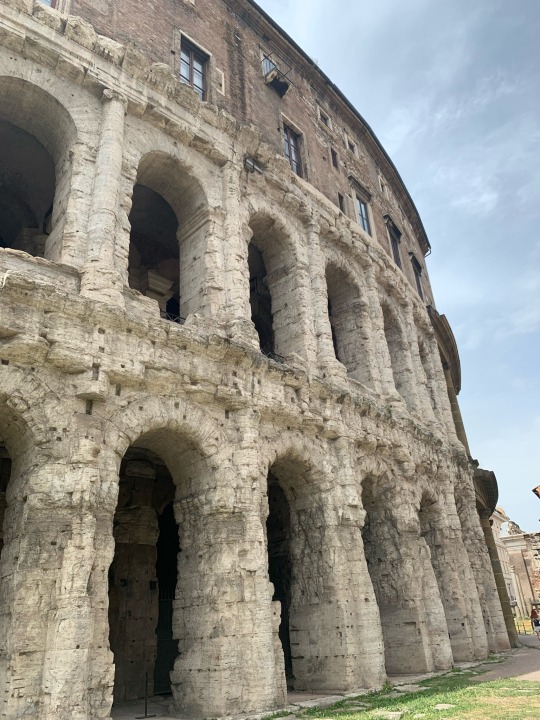
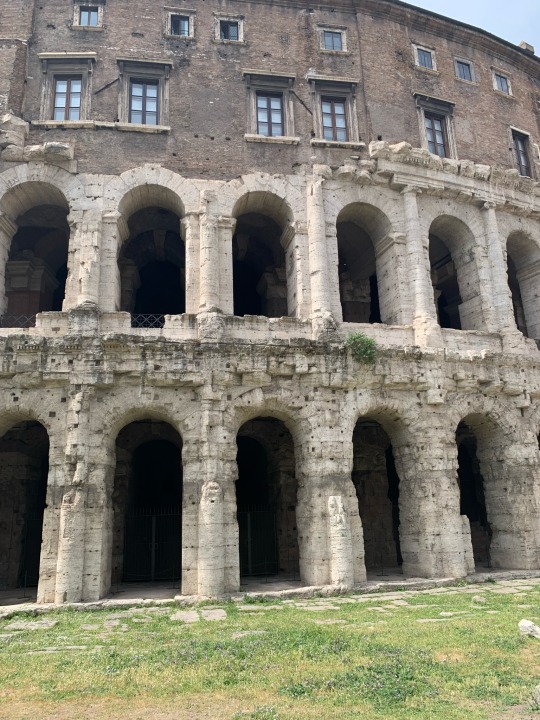
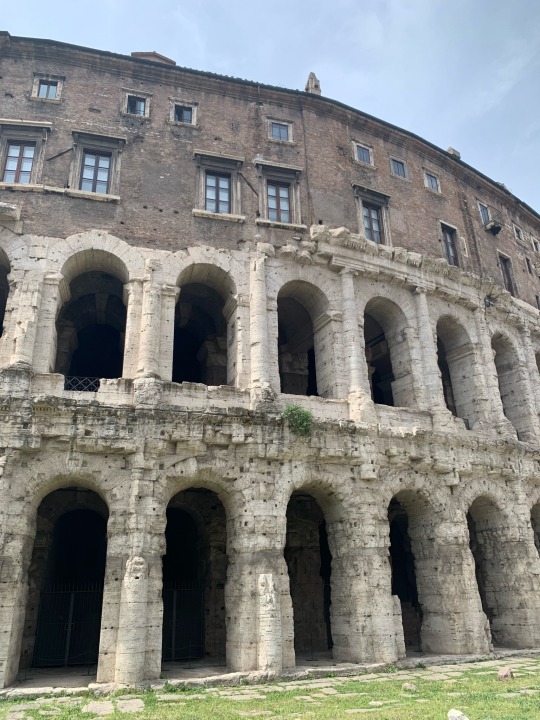
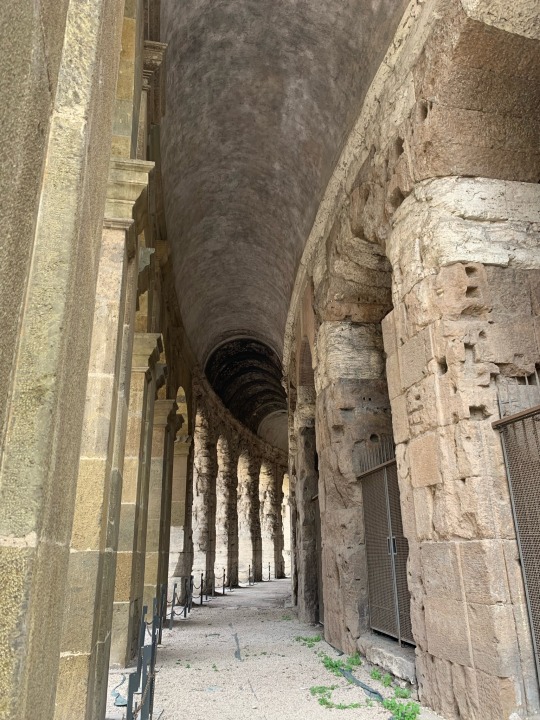
The Roman theater of Marcellus. With modern apartments on top.
150 notes
·
View notes
Text
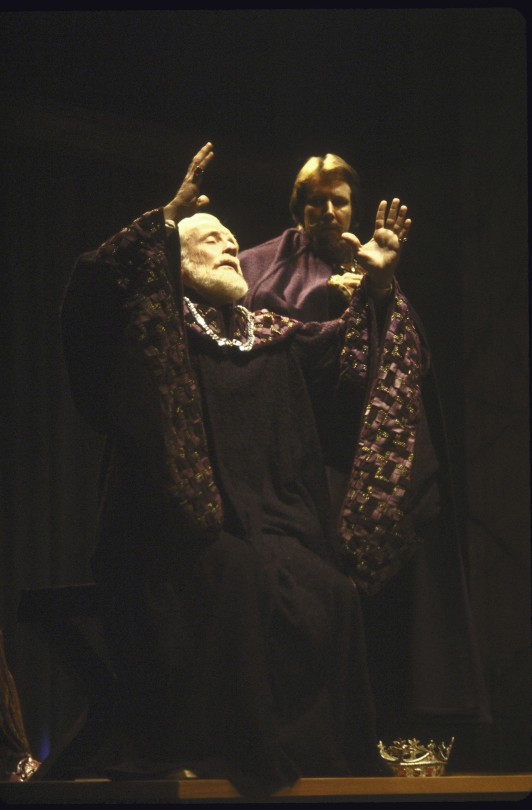
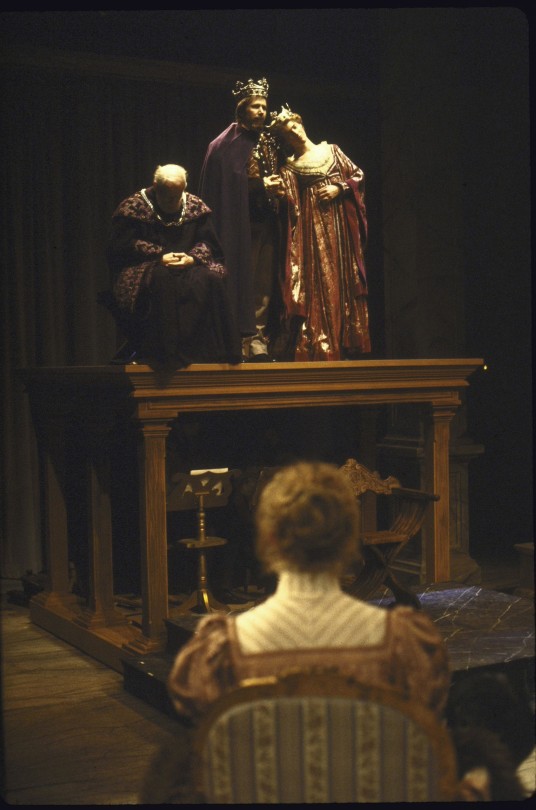
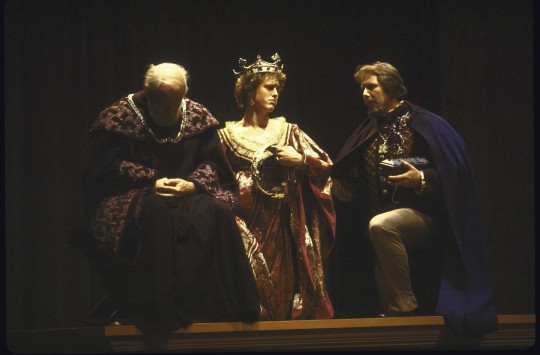
J.T. Walsh as Marcellus/Hecuba Speech/Luciano/English Ambassador in Anspacher Theater's production of Hamlet - New York, 2nd December 1982 - 16th January 1983
3 notes
·
View notes
Text
three observations / thoughts from reading the editorial notes in my new physical copy of Hamlet (the pelican edition, edited by a. r. braunmuller):
1. There's this bit from Act 2 Scene 2 where Hamlet is telling Ros and Guil about how he's depressed, how all the beautiful things in the world mean nothing to him. The thing that stuck out to me on this flip-through was the highlighted line and associated footnote below:

If we go with what is "traditionally supposed" as canon, then, it makes this line one of the most direct fourth-wall breaks in the whole show (that isn't a narrative device i.e. the soliloquies), because it implies that Hamlet sees the literal ceiling of the theater the play is being performed in.
You could just say that the golden fire refers to the real stars and such, making the "roof" metaphorical... but that's less fun.
2. There are a lot of bird allusions and metaphors in this play. Not just the “special providence in the fall of a sparrow” line that seems to haunt me specifically, but a lot of times that people are compared to birds.
marcellus calling for hamlet like how a falconer would apparently call a hawk in act 1 scene 5 when he's left on the battlements after the ghost disappears ("Illo ho ho, my lord!")
woodcocks (foolish birds) caught in springs (traps) (see polonius in act 1 scene 3 (talking about hamlet or ophelia, i think?), and laertes once he starts dying)
knowing a hawk from a handsaw, a spy from a true friend (act 2 scene 2) (according to the book "handsaw" is also supposed to sound like "hernshaw", a type of heron)
"it cannot be but i am pigeon-livered" (also act 2 scene 2)
cladius' limed soul (act 3 scene 4), "limed" apparently referencing birdlime, a gluey material used to snare birds
osric, the "lapwing" who "runs away with the shell on his head", comparing him to a freshly hatched baby bird
and at least one or two more that are currently slipping my mind.
Now, I’m relatively new to analyzing Shakespeare's works in this depth, so maybe this is a trademark in all his stuff, or maybe it was just common at the time; maybe it isn’t meant to be a pattern.
But amongst all those lines, I read this (part of Hamlet talking to Horatio after the play-within-a-play, leading up to him bragging to Horatio that he could definitely get a whole share in an actors' company):


And, given how meta Hamlet is as a play (see section 1/3 of this post)… perhaps this line, as unemphasized as it is, is meant to re-contextualize the rest of those bird references as pointing out / reminding us that all the characters are actors? Both in the literal meta sense and also the thematic “every character is playing a role for others and engaging in varying levels of deceit” sense?
Again, it’s possible I’m giving this more weight than it’s due because of my lack of context, but. It’s an interesting possibility, at least.
3. Okay, this last one is just funny. Remember when Laertes and Claudius are just beginning to brainstorm how they’ll eliminate Hamlet in the last scene of Act 4, and Claudius alludes to some skill of Laertes’ (fencing) that someone else has been spreading the word about? Do you remember who that someone was?
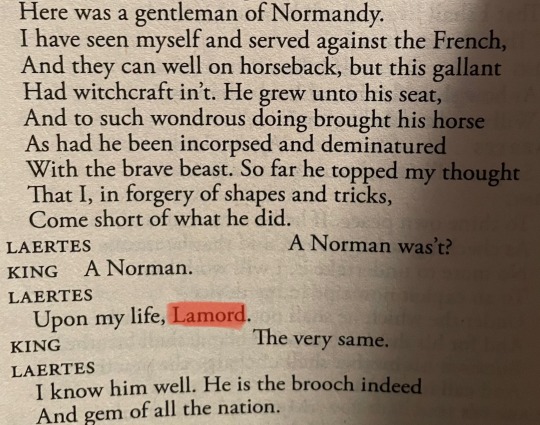
Well, the thing about this noted excellent horse-rider is…

Obviously, the only conclusion to draw from this is that the guy talking up Laertes’ fencing prowess is the literal Grim Reaper, setting things in motion for the fated fatal duel, and neither Claudius nor Laertes had the thought that taking such inspiration from a guy named as such might lead to an unfavorable end. Good job, you two.
#hamlet#a bonus small thing that almost certainly is just a coincidence but one that appeals to me:#the two major theaters shakespeare's plays were performed in at his time were the rose (first) and (then) the globe#r and g. ros and guil. :)#(espec cause rosen = rose and guil = guilded like the globe's roof)
13 notes
·
View notes
Text
The Bridgerton Family Hamlet cast list
this post is partly @glintglimmergleam's fault for having a line about Eloise playing Ophelia (badly) and partly Luke Thompson's fault for having played Laertes in one of my favorite productions.
Hamlet is Anthony's favorite play, so of course he chose it for their family theater experience, and of course he plays Hamlet himself. His father was his whole world for eighteen years, and then he watched him die and his mother become a ghost. He's responsible for far too much and doesn't know who he is without the grief that's shaped him, and the certainty that he will not live past his father's age.
Benedict plays Laertes, the protective but silly big brother, who goes out having wild libertine adventures and discovering who he is, and he was also old enough to feel the loss of their father in a way that even Colin didn't, and he brings his endless capacity for love to the role. In some ways he and Anthony are as different as two brothers can be, but in other ways they have the closest relationship, so they make good foils.
Colin has the acting chops to memorize long meandering speeches, so he gets to be Polonius. Everyone thought that should be Anthony because he's bossy and dad-like, but he's the oldest so he gets to be the hero, so there! Colin is also Polonius because he's self-important and paternalistic and won't shut up about his travels, and thinks Polonius is heroic in the same way Polonius himself thought Julius Caesar was the hero of Julius Caesar, lmao.
Everyone assumed Daphne was a shoo-in for Ophelia, the young beautiful ingenue but Eloise was very persuasive that it should be her role, so instead she plays Gertrude, trying to keep a handle on her world that has changed so entirely with her husband's death, and she can exude queenly dignity just as well as youthful exuberance.
Eloise has one goal and one goal only, and that's to give Ophelia some much-needed agency in a world of men telling her what to do. She's not so good at playing the early scenes where despite her best efforts the script still has her obey her father, but she plays the "mad" scenes with a boiling anger at her circumstances that says she's completely sane and that's what's causing her such grief.
Francesca was really excited to play both Claudius and The Ghost, a common conceit in Hamlet, and she has the range to make the brothers feel distinct and memorable. She was also the only one who could get through a scene of pretending to be married to a sibling without giggling (how did Anthony and Eloise manage as Hamlet and Ophelia? well they were both so into the character analysis that they didn't mind too much who was playing opposite of them)
Gregory is Rosencrantz and Guildenstern. Yes, both of them; he has two hats he keeps switching between whenever he's in a scene. He's also the soldier Marcellus, and whatever minor roles are needed.
Hyacinth gets to be Horatio, Hamlet's best friend and confidant, and also the one who observes everything happening around her and asks questions to clarify the plot. Anthony thinks there's something nicely full-circle about Horatio carrying the story to Fortinbras and all the survivors, and Hyacinth being so much younger she's almost in a different generation from him.
4 notes
·
View notes
Text
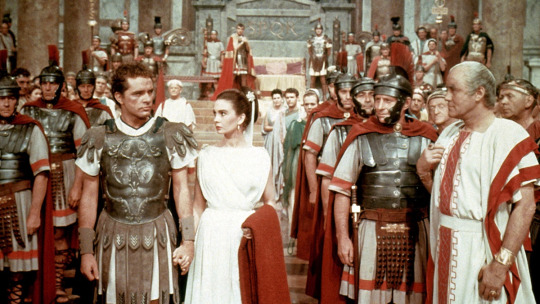
The Robe (1953)
Henry Koster’s The Robe, distributed by 20th Century Fox, appeared near the beginning of an era where religious epics and sword-and-sandal films became massive box office draws worldwide. Cecil B. DeMille’s Samson and Delilah (1949) and Mervyn LeRoy’s Quo Vadis (1951) had already laid the foundation on which Koster’s film, adapting Lloyd C. Douglas’ novel of the same name, would find its success. Despite The Robe being highly influential in Hollywood and becoming the highest-grossing film of 1953, the likes of DeMille’s The Ten Commandments (1956) and William Wyler’s Ben-Hur (1959) overtook it artistically and financially – no shame there, as those are two far superior films.
So what is The Robe’s claim to movie history beyond its initial theatrical earnings? When The Robe first came to theaters, 20th Century Fox advertised it as the first film ever made in CinemaScope. Created by Fox’s president, Spyros P. Skouras, CinemaScope was a format in which a widescreen camera lens contracted its widescreen shots onto regular 35mm film and, during theatrical projection, another lens would de-contract the image from the 35mm film in order to project a widescreen format. Theaters would only need to make minor, inexpensive modifications to their projectors in order to show a film in true CinemaScope, a 2:55:1 widescreen aspect ratio. Almost all other films were shot in the Academy ratio at the time (1.37:1, close to the 4:3 ratio – think: black bars on the left- and right-hand sides of a widescreen monitor – seen on many older standard computer monitors and televisions). With increasing competition from television, Fox executives believed CinemaScope could be a way to lure audiences back into theaters. Despite this overreaction from Fox’s executives (as well as the other major Hollywood studios), the legacy of CinemaScope’s innovation is still apparent today. Seven decades later, widescreen formats, not the Academy ratio, are the default in film and television.
Walking through the markets of Rome, returning Roman Empire tribune Marcellus Gallio (Richard Burton) reunites with his childhood sweetheart, Diana (Jean Simmons), who is now promised to Marcellus’ rival, Caligula (an always-sneering Jay Robison). Not long after, Marcellus – out of pettiness rather than financial sense – outbids Caligula for the Greek slave, Demetrius (Victor Mature). Marcellus immediately frees Demetrius, but Demetrius thinks of himself as honor-bound to stay by Marcellus. Elsewhere, an incensed Caligula reassigns Marcellus to Palestine – which, to the film’s Roman characters, might as well be the armpit of the Roman Empire. Marcellus and Demetrius go to Jerusalem, where they witness a man named Jesus enter the city, heralded by crowds of Jews greeting him with palms. Several days later, Judean Governor Pontius Pilate (Richard Boone) orders Marcellus to crucify Jesus on Calvary. Marcellus executes the order but, during and after the crucifixion, witnesses and experiences supernatural events. Demetrius, who has become a follower of Jesus during that week, obeys Marcellus when he asks him to fetch Jesus’ robe. The moment Marcellus dons the robe, he suffers something like a seizure. He falls out with Demetrius, and spends the rest of the film reckoning with his conscience over his role in Jesus’ crucifixion.
The film also stars Michael Rennie as Peter, Dean Jagger as Justus, Torin Thatcher as Senator Gallio, and Ernest Thesiger as Emperor Tiberius. Michael Ansara and Donald C. Klune are both uncredited as Judas Iscariot and Jesus, respectively.
The Robe has the misfortune of peaking in the first half. The adapted screenplay from Gina Kaus (1949’s The Red Danube), Albert Maltz (one of the blacklisted Hollywood Ten; 1950’s Broken Arrow), and Philip Dunne (1941’s How Green Was My Valley) is at its most interesting whenever Marcellus and Demetrius find themselves at odds with the other. In the scenes they share together, that happens often. But when Demetrius disappears after their disagreement over Jesus’ robe midway through, the film begins to sag with no foil for Burton to play off of.
For the entirety of this film, Richard Burton’s acting is overwrought. Burton, who had just arrived in Hollywood the year before to star in My Cousin Rachel (1952), is leaning too deeply into his theatrical roots here. His grandiose exclamations, stiff facial acting, and inconsistent line delivery result in a performance that is easily the weakest part of this film (Jean Simmons is also guilty, to a far lesser degree, of these same flaws in her performance). The Robe requires Burton’s Marcellus to undergo a spiritual conversion – becoming an adherent of Jesus despite following orders to crucify him, a developmental arc more dramatic than any other character’s in this film. Burton’s inability to convincingly sell this conversion (the stoic masculine tension, which some will interpret as coded homosexuality, between Burton’s Marcellus and Mature’s Demetrius does not help) weakens the film’s spiritual power.
Instead, it is Mature who is The Robe’s reliable scene-stealer. Mature, at one time likened to a “miniature Johnny Weissmuller”, has the classical Greek physique that, frankly, Burton does not. And in contrast to Burton at this time in their careers, Mature was more capable of a nuanced performance, as evidenced in his roles as Doc Holliday in My Darling Clementine (1946) and Nick Bianco in Kiss of Death (1947). As Demetrius, his soul hardened through his enslavement, there remains hope for a life free from the yoke of the Roman Empire and its callous slave masters. One sees it in his face during Holy Week, culminating with seeing Jesus dying on the cross. His faith is there, too, during a torture scene upon his return to Rome and an encounter with Peter. Amid miracles and cruelties, Mature’s Demetrius is simply the most compelling character of The Robe and the viewer – through Mature’s performance, especially in contrast to those of Jean Simmons and Richard Burton’s – can discern his genuine turn of faith. The Robe’s failure to showcase this inner awakening more believably is the fault of its two central actors and its screenplay; Mature’s performance and Demetrius’ characterization are all that saves the narrative.
One aspect of Christianity that The Robe captures confusingly (and oxymoronically) is the insignificance of Judea and the prominence of early Christianity in Rome in the time immediately following Jesus’ crucifixion. Oftentimes in Biblical epics, Judea is a centerpiece of the Roman Empire when, in truth (and in The Robe), it was a relative backwater. By Caligula’s reign between 37 and 41 CE, Christianity almost certainly would not have had a substantial presence in Rome at that time. So while Caligula would probably see Christianity as a threat, the film’s decision to treat the early Christians as a clear and present danger to his rule and the Roman state religion is the film’s glaring historical inaccuracy. The Robe – the book and the film – muddies the timeline from Jesus’ crucifixion to the film’s final scene in Caligula’s court. The relative suddenness of the Roman Empire seeing the early Christians as a very minor cult into becoming an Empire-wide menace is difficult to reconcile.
With few other post-silent film era Biblical epics as a guide, The Robe helps set the aesthetic of its fellow Biblical epics and sword-and-sandals movies going forward through its costumes and production design. The work of costume designers Charles LeMaire (1950’s All About Eve, 1956’s Carousel) and Emile Santiago (1952’s Androcles and the Lion, 1958’s The Big Country) is resplendent, regardless of either the Roman or Judean setting. Art directors Lyle R. Wheeler (1939’s Gone with the Wind, 1956’s The King and I) and George Davis (All About Eve, 1963’s How the West Was Won) and set decorators Walter M. Scott (All About Eve, 1965’s The Sound of Music) and Paul S. Fox (The King and I, 1963’s Cleopatra) all make full use of the CinemaScope format and color to enliven the scenery – a sumptuous visual treat for the viewer, and, to reiterate, setting a standard that the crew of The Ten Commandments and Ben-Hur both would study and surpass.
Of all of 20th Century Fox contracted stalwarts behind the camera, composer Alfred Newman was the studio’s most important figure. If Fox’s executives needed a composer to craft a score for what they would consider would be their prestige motion picture of the year, Newman – who composed the original 20th Century Fox fanfare and its CinemaScope extension (the extension, which is now inextricable from the fanfare, was first introduced in 1954’s River of No Return) – was almost always their first choice.
youtube
In one of Newman’s finest scores of his career, it is his choral compositions, with incredible help from his longtime choral supervisor Ken Darby, that form the score’s emotive spine. Jesus’ motif, shared between wordless choir and strings, appears almost immediately, in the opening seconds of the “Prelude”. During the many invocations of a Messiah before Jesus’ first physical appearance in The Robe, his motif shifts, changes form, and modulates – imparting not spiritual comfort or devotion, but a mysteriousness and otherworldliness. When Jesus (whose face we never see) first appears in Jerusalem on Palm Sunday, the cue “Passover/Palm Sunday” represents one of the rare juxtapositions of the brass-heavy martial music representing the Roman presence in Judea and Jesus himself. The modulation to a major key at 1:22 in this cue, with festive percussion, also includes one of the only instances of celebratory choral music in the score. Jesus’ motif in “Passover/Palm Sunday”, appears at 2:26 – cementing his (and Christianity’s) association with the cue, and appearing as the only instance in which one might consider this motif triumphant.
Choruses, which Western viewers so often associate in religious movies as angelic musical devices, become mournful in “The Crucifixion” – arguably the standout cue of Newman’s score. Even though one might be well aware of Jesus’ death and can anticipate a turn in the music (starting moments earlier in “The Carriage of the Cross”), it is startling to hear Newman’s composition change so rapidly. But it is in these several minutes depicting Jesus’ final moments that Newman, with modifications to his harmonies and orchestration, transforms Jesus’ motif to evoke its tragic dimensions. It is magnificent scoring from Newman, and this is not even mentioning his wonderful demarcation of Roman and Judean identities through his score.
In a film about faith – how it comforts, destroys, heals, and vexes – one wishes that the characterization of The Robe’s supposed lead characters in Marcellus and Diana could feel more plausible. The film’s final scene, possibly allegorizing of screenwriter Albert Maltz’s travails as a blacklisted figure in Hollywood, is decently powerful, but it needs far more storytelling support from numerous scenes preceding it.
As it is, the film’s expressive power lies within Demetrius and Victor Mature’s performance. So how fortunate that, because Fox also wanted to make a sequel to The Robe even before it finished production, Mature also signed a contract to appear in a sequel. Nine months after The Robe made its theatrical debut, Victor Mature starred in Demetrius and the Gladiators, directed by Delmer Daves and also seeing Michael Rennie and Jay Robinson reprise their roles as Peter and Caligula, respectively. Though it did not top the box office for that year like The Robe did, Demetrius and the Gladiators was a financial boon for Fox.
With Hollywood’s major studios always ready to respond to the box office successes of their rivals, The Robe helped make possible the decade of Biblical and sword-and-sandals epics to come – and the required viewings for many a Sunday School student in the years hence. These films were Studio System Hollywood in full maximalism, adopting human and tactile scales seldom seen today.
Yet outside of churchgoers, The Robe – for its CinemaScope and genre-specific innovations – has seen its standing slip gradually over the years, no thanks to the reputations of better movies of this tradition and, regrettably, decisions to keep 20th Century Fox’s valuable past under lock and key. 20th Century Fox’s refusal to distribute their classic films more often and more widely – before and after the studio’s 2019 takeover by the Walt Disney Company (and post-takeover, I believe the situation is now worse) – is resulting in films like The Robe slip through the proverbial cracks of film history, sights unseen for younger film buffs. That is unfortunate, especially as The Robe, almost incidentally (and no matter my aforementioned criticisms of the work itself), continues to quietly wield, by virtue of being the first CinemaScope film, a remarkable influence over cinema worldwide.
My rating: 6/10
^ Based on my personal imdb rating. My interpretation of that ratings system can be found in the “Ratings system” page on my blog. Half-points are always rounded down.
For more of my reviews tagged “My Movie Odyssey”, check out the tag of the same name on my blog.
#The Robe#Henry Koster#Richard Burton#Jean Simmons#Victor Mature#Michael Rennie#Jay Robinson#Dean Jagger#Torin Thatcher#Richard Boone#Michael Ansara#Leon Shamroy#Alfred Newman#Ken Darby#Charles LeMaire#Emile Santiago#Lyle R. Wheeler#George Davis#TCM#My Movie Odyssey
2 notes
·
View notes
Text
Tiny interview Michael and Tony did for the Southwest Connector in order to help promote Jersey Boys! (X) (Published Wednesday, May 17, 2023)
It's a relatively short read and if you've seen next to any recent Gruber interviews you'll know this stuff anyways however to get confirmation that Tony DID work in New York for a bit was cool (I wasn't certain about it however I was thinking he might of cause of blah blah)
Article below the cut:
By Tesha M. Christensen
Two Armatage residents are wrapping up a run in “The Prom” at the Chanhassen Dinner Theater, and looking ahead to “Jersey Boys.”
Spouses Tony Vierling and Michael Gruber actually met at the Chanhassen Dinner Theater.
It was 2007 and they were both in the world premiere of Irving Berlin’s “Easter Parade.”
“I was brought in from New York City to play Don Hewes and Tony was in the company. We became great friends during the run of the show, and our relationship progressed from there,” recalled Gruber. “It was one of those decisions that really did change the course of my life.”
Vierling added, “We’ve been together 16 years and married for nine years. We moved back to Minneapolis, to the Armatage neighborhood, in 2010 after having been working in New York and being on tour.”
What drew you to acting?
Gruber: I remember putting on plays for my second grade class. My teacher must have been very open minded. I can’t remember what they were about, but I do remember being fairly extroverted – which is funny because I’m quite an introvert in my adult life. But nevertheless, I do love being a part of stories that can affect an audience in a positive way.
Vierling: I started acting at the age of eight. I have always been a bit dramatic! Putting on plays in my basement, with my best friend in his garage, at the church, anywhere I could! I started actually acting in a local theatre in Des Moines, Iowa, as well as doing school plays. Did commercials and voice over work as a kid and teenager. I have always loved the group dynamic of theatre, and the rapport that is shared with the audience.
What is exciting about this production?
Gruber: I am in the ensemble so I get to play several different characters. That is always delightful because I have much broader leeway to create something personal and fun. I also understudy one of the principals, Trent Oliver, and due to COVID-19 in the company, I had to learn the role of the high school principal, Tom Hawkins, in two days and perform it for three performances until the actor playing the role could return to the production. That was a wonderful challenge.
Vierling: I play several smaller characters in this show. All of them are very silly, which is great fun. What excites me about this show is the young people in our cast. They are all so talented; it’s a very energetic show for them! I really love watching their work every night!
As far as my roles and growth in this show, every job is a learning experience. Since my parts are smaller, I am more of a support this time. Creating characters and filling scenes with ideas that other actors can play against adds texture to the show, making it a richer experience for us all.
What is it like to perform with your significant other?
Vierling: It is a real joy to work with my spouse every night. We have been so lucky to be able to consistently work together. Being on a performance schedule is challenging and can be pretty difficult if one of the couple is not home every night. It takes another actor to understand the demands of the job.
Gruber: It is great to be able to share the stage with Tony. We have had the opportunity to play opposite each other in “Singin’ in the Rain” as Don and Cosmo at the Ordway, in “Holiday Inn” as Jim and Ted, and “The Music Man” as Harold and Marcellus.
What’s next?
Gruber: We both will be in the company of Jersey Boys. I’m cast as Gyp Decarlo and Tony will play Joe Pesci.
Vierling: We start rehearsals in a couple of weeks and open in mid June. Should be a very fun show. Minneapolis has such a rich a diverse theatre community. The talent here is amazing, and we are so lucky to have so many amazing theatres to showcase all of that talent. Get out and support local theatre!
#tony vierling#Interviews#Articles#chanhassen dinner theatres#Jersey Boys#Southwest Connector#Trying to post stuff like this more often#2023#2020s#Michael Gruber
5 notes
·
View notes
Text

“What does Marcellus Wallace look like?”
She went into the theater on base, saw ten seconds of pulp fiction without any firmer context and now has been asking this question all morning.
Furthermore, making an announcement about the question. Which everyone pretty much laughed for hours on end about it.
But it was a genuine question and nobody realized this.
4 notes
·
View notes
Text
High School RA AU, (or headcanons by a formerly homeschooled person who doesnt know how it works so its just a musical)
So, Will is canonically a good singer right? So, in a highschool au he's a MASSIVE theater kid. Gets all the good roles. The sort of guy a high school troupe kills for.
Gilan is the new drama teacher. He wants to put on Music Man (I'm in the show rn go with it) but needs more guys so he convinces Horace, ths star of the fencing club to join. He's unexpectedly realy good and lands Harold Hill, High-School Musical style.
Will (who got Marcellus) is initially resentful. He can be a bit of a diva, since he's talented. Cassandra is Marian, and Alyss, the head of the debate club, takes over doing sets. She is not much of a theater kid, but keeps getting roped into helping out.
Will keeps complaining to Halt, his foster dad about Horace and how "perfect" he is. Halt, who has heard about the drama from Crowley, the school principle, observes that Will appears to be obsessed with him. A true-blue rivals to lovers arc is in full swing.
Slowly, Horace wins Will over through his genuine kindness and charm. They have a blast acting off of each other. All of a sudden, Will realizes he's jealous of Cassandra, who gets to do a love ballad with Horace.
The night of the show, Will realizes his true feelings. In a burst of emotions, he sings "Till There Was You" to Horace, who joins in in a perfect, cheesy duet. For his part, Horace had been planning his own confession as well (he baked cookies with Jenny because "Giving people food shows love, right?")
I just wrote a romcom Lord help me
#i've...been into romance a lot lately fellas#this was supposed to be something dfferent#rangers apprentice#au
7 notes
·
View notes
Text
the official @shaxqueer list of "shakespeare i've done"
*updated 5/6/24*
All's Well That Ends Well
Antony and Cleopatra: saw a performance that friends were in, which was cool because nobody does this play
As You Like It: saw a performance that a friend was in, would love to be in one day!
Comedy of Errors
Coriolanus: I really really want to direct/act in it (thanks @lungthief). only read it so far though
Cymbeline: no, but had vague plans to direct it before the pandemic
Hamlet: Holy moly yes. 2019-2020 Claudius/Ghost/asst. director; 2021 Rosencrantz/Marcellus; 2023 Ophelia; 2024 fight choreographer. Plus ones that didn't get off the ground (2021 Player Queen; 2020 Fortinbras/Marcellus).
Henry IV, Part 1: A personal fave, but only read (once with @socialshakespeare!). Prince Hal is my dream role.
Henry IV, Part 2
Henry V: Saw friends perform
Henry VI, Part 1: Watched as part of Hollow Crown, read as part of Rose Rage
Henry VI, Part 2: ditto
Henry VI, Part 3: ditto
Henry VIII
Julius Caesar: Another fave. Will be fight choreographing this summer (2024).
King John: I played a character who played Constance and Arthur in a different show, does that count? I don't think anyone's gonna put on King John anytime soon...
King Lear: Was going to be involved in a Lear-adjacent show as Goneril and fight choreo, but it was cancelled
Love's Labour's Lost
Macbeth: Directed/performed an audio adaptation (2020, Malcolm/Banquo/Lady Macduff), acted in another (2022, Malcolm/Lady Macduff), and acting/fight choreo again (2023, Duncan/Lady Macduff). Plans are to fight choreo again (October 2024).
Measure for Measure: My problematic fave that I want to direct/act one day.
The Merry Wives of Windsor: Acted/adapted (2022, Mistress Ford/Slender)
A Midsummer Night's Dream: Acted/co-directed (2019, Titania/Hippolyta). Doing fight choreo in 2024.
Much Ado About Nothing: Did fight choreo in 2023, acting in 2024 (Don Pedro/Verges + other tracks)
Othello: Only read.
Pericles
Richard II: If you ask me what my favorite Shakespeare play is, unprompted, this is what I'll say. One day I'll direct/act in it. One day.
Richard III: One pandemic reading that never materialized (2020, Anne), and one audio drama that thankfully did (2024, Anne again).
Romeo and Juliet: I have the dubious honor of having played Gregory, Sampson, and Abraham... all at once (2018, different show). 2023 Nurse/Montague.
Taming of the Shrew: Alas, no. The 2024 production I was going to fight choreo was cancelled.
The Tempest: Did a virtual pandemic reading. But one day...
Timon of Athens: I wish.
Titus Andronicus
Troilus and Cressida: Underrated.
Twelfth Night: My first Shakespeare ever (2016? Captain and Priest). 2022 Sebastian, and currently (2024) Andrew + other tracks
Two Gentlemen of Verona: Another bucket list item.
A Winter's Tale
MISC. CLASSICAL THEATER + ADJACENT:
Emma (2023, Harriet)
Cyrano de Bergerac (2016, Cavalier 1/Cadet 1)
Doctor Faustus (planned to direct 2023, hopefully directing in 2024/25)
Edward II (have you ever read a play that sucked so much that you fell in love with it?)
On ne badine pas avec l'amour: performed IN FRENCH (2022, Camille)
The Legend of Sleepy Hollow (2017, ensemble)
Le Misanthrope (I have a dream to direct it with a female lead)
No Exit (2020, Inez)
A Christmas Carol (2021, Belle)
Emilia (2021, Lord Howard)
#personal#this really is for my personal memory#bc i don't think anyone finds my resume as interesting as i do lol#but if you do feel free to ask me about stuf!#*stuff#shakespeare i’ve done
0 notes
Text
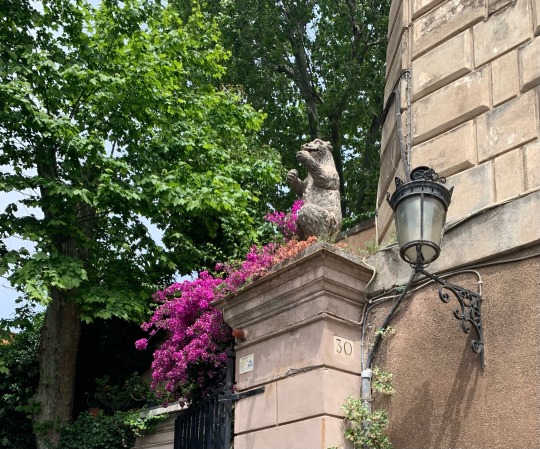
I walked around the theater Marcellus to see if I could peek into what would have been the performance space and is now probably a central courtyard. There was a gate guarded by what a probably supposed to be bears, but which I think look a lot more like honey badgers. I might try to sneak past bears. Decided not to risk it with honey badgers.
68 notes
·
View notes
Text
Buildings in Ancient Rome
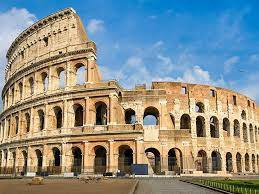
The Bureaucracy of Buildings in Ancient Rome: Ancient Rome boasted a remarkable array of buildings, each serving a specific purpose and showcasing the ingenuity and grandeur of Roman architecture. Here are some of the most iconic structures:
1. Colosseum: This elliptical amphitheater, inaugurated in 80 AD, remains an awe-inspiring symbol of the Roman Empire. It served as a venue for gladiatorial contests, public executions, animal hunts, and other forms of entertainment.
2. Pantheon: This temple, dedicated to all Roman gods, stands as a testament to Roman engineering prowess. Completed in 125 AD, its massive dome, the largest unreinforced concrete dome in the world until the 20th century, continues to inspire architects and engineers today.
3. Roman Forum: This rectangular plaza in the heart of Rome served as the center of political and social life for centuries. Here, citizens gathered to debate, vote, and attend religious ceremonies. Temples, basilicas, and other significant buildings lined the forum, forming a monumental complex.
4. Baths of Caracalla: These public baths, constructed in the early 3rd century AD, were not just places for washing; they were also social centers where Romans could exercise, socialize, and enjoy leisure activities. The vast complex featured hot and cold baths, steam rooms, swimming pools, libraries, and gardens.
5. Circus Maximus: This chariot racing stadium, built in the 6th century BC, was the largest in Rome. It could hold an estimated 250,000 spectators and served as a venue for exciting races, parades, and other public events.
6. Trajan's Market: This multi-level commercial complex, built in the early 2nd century AD, offered a variety of shops, offices, and warehouses. Its innovative design, featuring a series of hemicycles and vaulted spaces, showcased Roman architectural skill and served as a model for future marketplaces.
7. Ara Pacis: This altar, built in 13 BC to commemorate the return of peace after a long period of civil war, is renowned for its exquisite marble reliefs depicting scenes from the Augustan family and Roman mythology.
8. Mausoleum of Augustus: This cylindrical tomb, constructed in the 1st century BC as the final resting place for the first Roman emperor and his family, is a testament to the grandeur of Roman funerary architecture.
9. Theater of Marcellus: This massive theater, begun by Julius Caesar and completed by Augustus in 11 BC, could seat an estimated 15,000 spectators. It served as a venue for plays, comedies, and other theatrical performances.
10. Pantheon: This rectangular temple, dedicated to all gods, was built in the 2nd century BC and is one of the best-preserved examples of Roman religious architecture. Its impressive façade and spacious interior continue to captivate visitors today.
These are just a few of the many impressive buildings that helped shape the landscape of ancient Rome and continue to inspire architects and historians today.
#maria milani#Buildings in Ancient Rome#Buildings in Ancient Roman#Ancient Rome#roman history#ancient history#buildings in roman
0 notes
Text
The Jewish Ghetto
While the Jewish Ghetto does not sound like an appealing destination, it was a real find.
We started with lunch at La Taverna del Ghetto, which was wonderful. Since it was 4pm (after school), we had the place to ourselves and got great service to go with amazing food!
The ghetto “tour” includes some archeological sites, a few streets with one or two ghetto-age houses and a more modern synagogue with a museum. We had time to explore the archeological sites and walk through the neighborhood, but not the synagogue or museum. Next time.
A little history. The Jews have a sad history in Rome. They started, as immigrants, living and prospering outside the city in Trastevere. Around 1555, the pope created the Jewish ghetto and forced all of the community to move to a marshy area at the bend in the Tiber. They lived behind walls with strict curfews and had to wear yellow caps and scarves to identify their faith. The ghetto was finally closed and demolished in 1870. The city rallied and supported the building of the Synagogue of Emancipation in 1904. In 1943, 13,000 Jews were rounded up under the Nazis and 2000 were sent to concentration camps. Today, the area is being gentrified but the local Jews still gather in the neighborhood. It is in no way a ghetto as we might use the word in modern English. It is also an area of incredible ancient history.


We started our meal with Jewish style fried artichokes, a specialty of the neighborhood. I followed with cod cooked with tomatoes, raisins and pine nuts. Paul had an incredible lamb stew. Sigh.
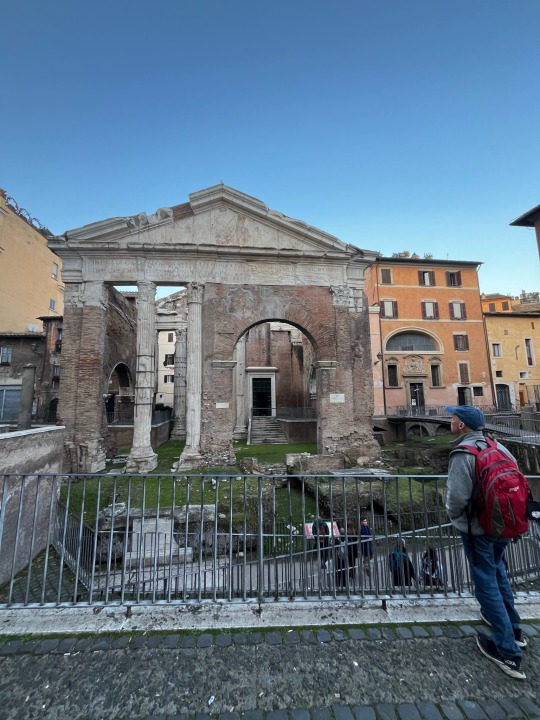
We started at the Portico of Octavia, built by Caesar in 27BC. It was the entrance to a long portico which led to the Theater of Marcellus
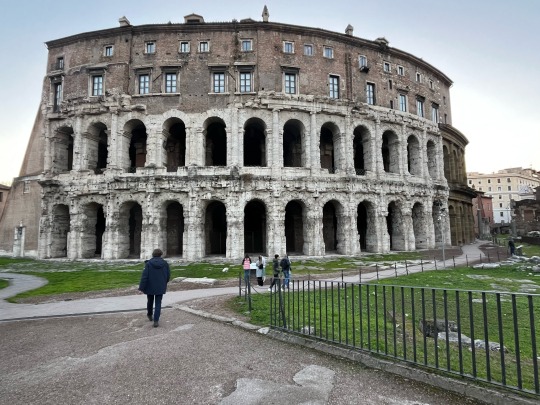
This theater dates from 11BC. Because it was a theatre, not an arena, it was open on the opposite side to a stage. That space, which faces the river, was later filled with more modern buildings which completely mask this incredible structure. We have walked by here dozens of times, along the river, and never knew this was hiding behind the other buildings.
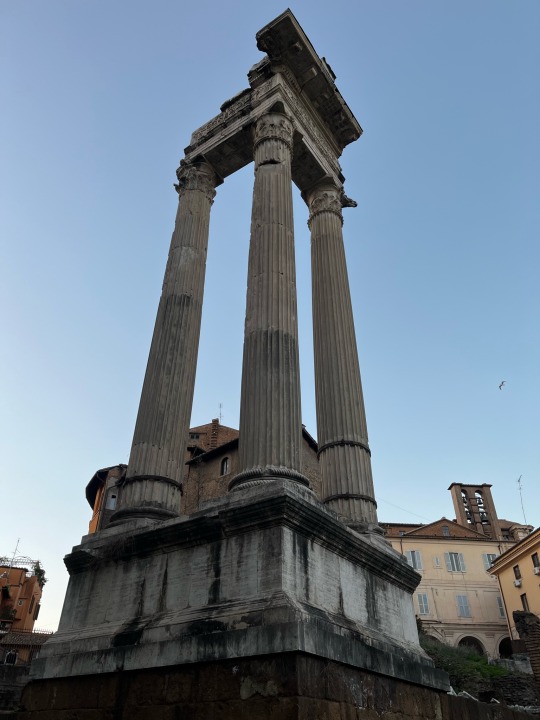
Between the theater and the portico are the remains of this Temple of Apollo which was built around 430BC. Yikes!
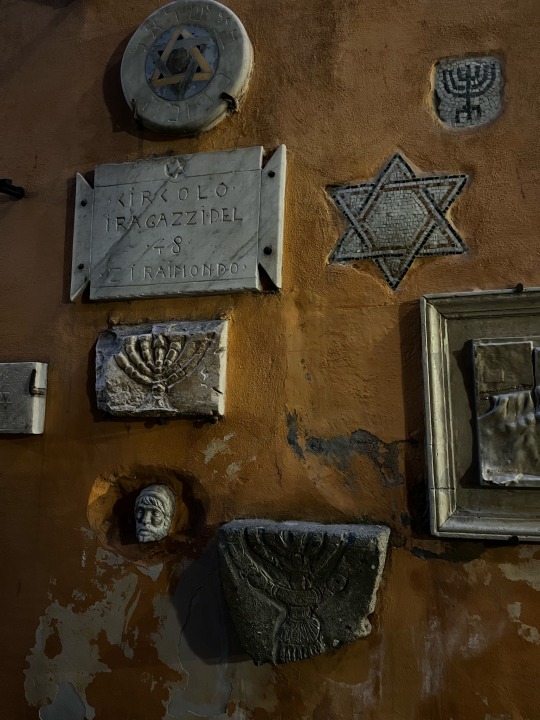
The oldest houses retain markers from their ghetto days.
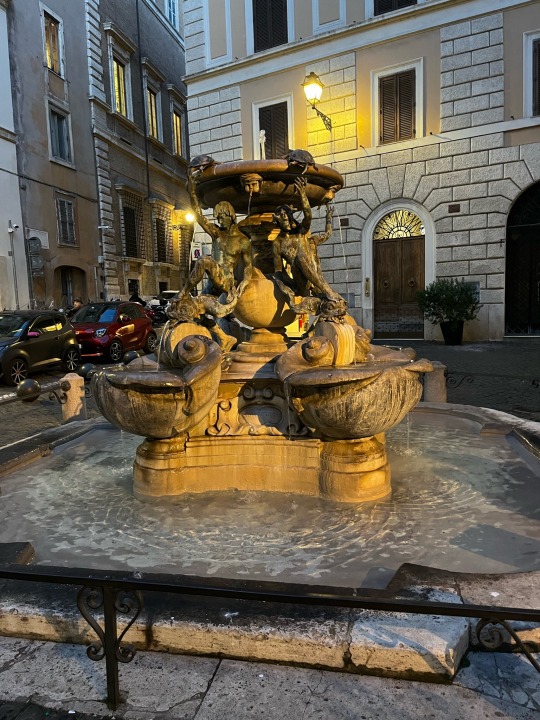
And tucked in a little square is this wonderful fountain from the mid 1500’s that was later embellished with turtles by my pal Bernini.
1 note
·
View note
Video
youtube
Amazing Historical Events That Occurred on January 17th🎉 #shorts #histor...
Amazing Historical Events That Occurred on 1/17
today
What Happened on January 17th
What Happened on the 17th of January
What Happened today
Today is January 17th and it's packed with some amazing facts about the day. Throughout history, January 17th has been a day of many remarkable events, and here are some of the most interesting ones
🎅🏼🎉 Unbelievable Historical Events on 1/17: 🔥 Blow Your Mind Away! 🔥
🎄🎁 Amazing Historical Events That Occurred on 1/17 🎄🎁
🎄🔎 Uncovering 🤩 Amazing Historical Facts 💡 🎁 🎉!
🤩 Today in History on January 17th: Uncover Amazing Historical Events!
🤩🗓️ January 17th - Relive Amazing Historical Events 🤩
🤩 Unbelievable 🔥 Historical Facts 🤯 🎄 🎁
#history
#historicalfacts
#historical
#historynerd
#historicaleducation
#historybuff
#historicalevent
#historicalplace
#historicalfigure
#historylesson
#historicalcontext
#historyfacts #history #historylovers #facts #ww #historymemes #historynerd #worldwar #historylesson #historybuff #historical #historylover #historygeek #historyinpictures #memes #factsdaily #didyouknow #funfacts #worldhistory #fact #dailyfacts #historygram #sciencefacts #historic #blackhistory #factsonly #war #historyteacher #onthisday #knowledge
Amazing Historical Events That Occurred Today in History January 17th
#historicalfacts,#historical,#historyfacts,#history,history,#historicaleducation,#historybuff,#historygeek,#historynerd,#historicalplace,#historicalfigure,#historicalevent,#historylesson,#historicalcontext,#shorts,#historylovers,#facts,#historymemes,#worldwar,#historylover,#factsdaily,#didyouknow,#funfacts,#worldhistory,#fact,#dailyfacts,#historygram,#sciencefacts,#historic,#blackhistory,#factsonly,#war,#onthisday,#knowledge,historical events, history channel,
#AmazingHistoricalEvents #TodayinHistory #January17th
Amazing Historical Events That Occurred Today in History January 17th
In 1362: In a tragic event, at least 25,000 people were killed on the shores of the North Sea in Saint Marcellus' flood.
In 1773: Captain James Cook made history as the first to cross the Antarctic Circle.
In 1775: In Kalisk, Poland, nine elderly women were wrongfully accused of causing bad harvests, and were burned as witches.
In 1903: The El Yunque National Forest in Puerto Rico was added to the United States National Forest System.
In 1929: The beloved character Popeye made his first appearance in the comic strip "Thimble Theater."
In 1991: Operation Desert Storm began, marking the beginning of the Gulf War.
https://splinterlands.com?ref=mortonmattd1
https://hiveonboard.com?ref=m0rt0nmattd
https://ecency.com/signup?referral=m0rt0nmattd
https://www.risingstargame.com?referrer=m0rt0nmattd
https://exode.io/?ref=790e9e1
https://bit.ly/WinCryptoWithMe
https://bit.ly/FreeCryptoDrip
https://bit.ly/FreeZECdrip
0 notes